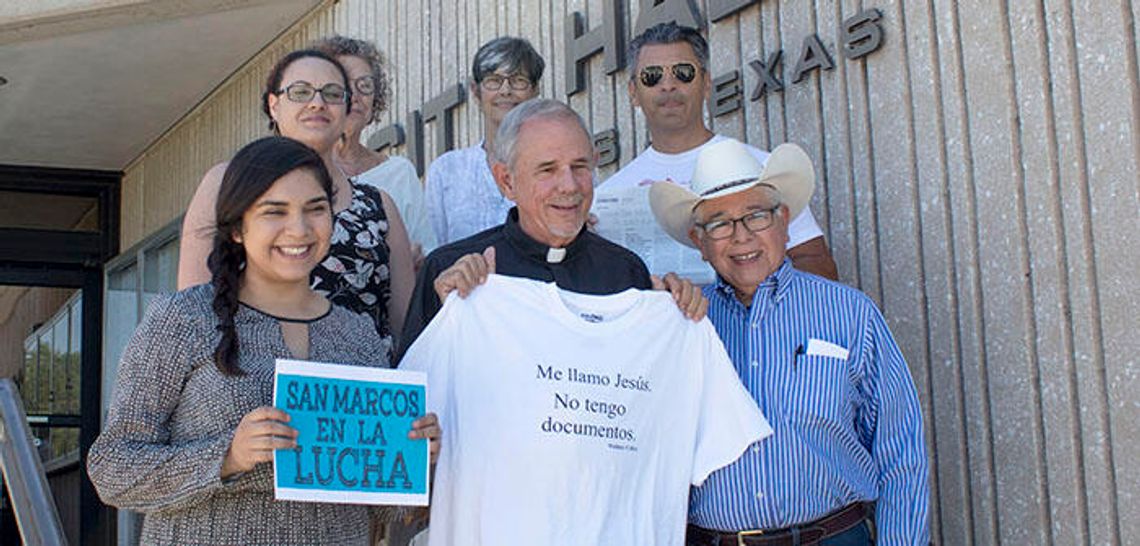[dropcap]A[/dropcap] coalition of civic groups banded together at San Marcos City Hall Thursday to present their draft resolution opposing Senate Bill 4, a measure regarding the ban of sanctuary cities.
Members of the League of United Latin America Citizens (LULAC) Council No. 654, Mano Amiga, the San Marcos Cinema Club as well as representatives from local businesses and clergy voiced concern over SB4, which was signed into law by Gov. Greg Abbott in May. SB4 will take effect starting Sept. 1.
The draft resolution was accompanied by over 600 petition signatures and 50 businesses opposed to the bill.
According to the Immigrant Legal Resource Center, there are currently 11 million illegal immigrants spread across 168 counties in the U.S. Only 99 of these counties accept federal requests to hold arrestees in jail to check their immigration status.
Federal officials must rely on local police to help enforce federal immigration laws, but the law thus far hasn’t required local authorities to detain illegal immigrants just because their federal counterparts make a request.
In fact, there are 633 counties in the U.S that actually limit how much local police cooperate with requests from federal authorities to hold immigrants in detention.
Proponents of SB4 hope that such bills will help clear the confusion between different counties who don’t share the same policies and help local authorities work with federal officials.
However, groups such as LULAC and Mano Amiga are concerned such bills also open the door to discrimination and wither relations between police and civilians.
“I stand here today in the shoes of giants who forged a group of activists of American and Mexican descent that said, ‘That’s enough ... They fought so we would have economic opportunity and equal education for our children.”
Former San Marcos Mayor Frank Arredondo
Mano Amiga was formed in February in response to Immigration and Custom Enforcement (ICE) raids that began in Austin.
“My biggest concern with SB4 is that it erodes public trust between citizens and police officers. I’m concerned that people will be less willing to report crimes to police and that immigrants will be forced to live in fear,” said Karen Muñoz, local organizer for Mano Amiga.“Police have enough to worry about as it is; they shouldn’t be enforcing federal immigration law.”
Former San Marcos Mayor Frank Arredondo, founder & current vice president of LULAC Council No. 654, spoke against the bill while citing the importance Latinos have had in the U.S.
“I stand here today in the shoes of giants who forged a group of activists of American and Mexican descent that said, ‘That’s enough,’” Arredondo said. “They fought so we would have economic opportunity and equal education for our children.”
Arredondo said the bill harkens back to events that lead to the creation of groups like LULAC, which was established largely by Hispanic veterans in 1929 in order to end ethnic discrimination against Latinos in the U.S. It has remained the oldest surviving Latino civil rights organization in the U.S.
“In the 1920s, Latinos in America needed a voice, it was a period like one we live in today; border instabilities, economic concerns, international concerns and discriminations against American Latinos.” Arredondo said.
The bill has also drawn criticism from a growing number of businesses and organizations that plan to boycott Texas in response.
Andrea Torres, a spokesperson with the San Marcos Cinema club, said the bill has forced the group to rethink its outreach strategy regarding out-of-state filmmakers. She fears SB4 could impact the film industry, with out-of-state filmmakers potentially boycotting Texas due to the law.
“If it looks anything like Arizona’s boycott after they passed an anti-immigrant law in 2010, it means we must instead shift focus to recruiting filmmakers and filmgoers from inside Texas,” Torres said. “However, if any out-of-staters do attend, we’ll be certain to promote the ‘loyal & local businesses’ in San Marcos who are doing what it takes to fight this hateful law.”











